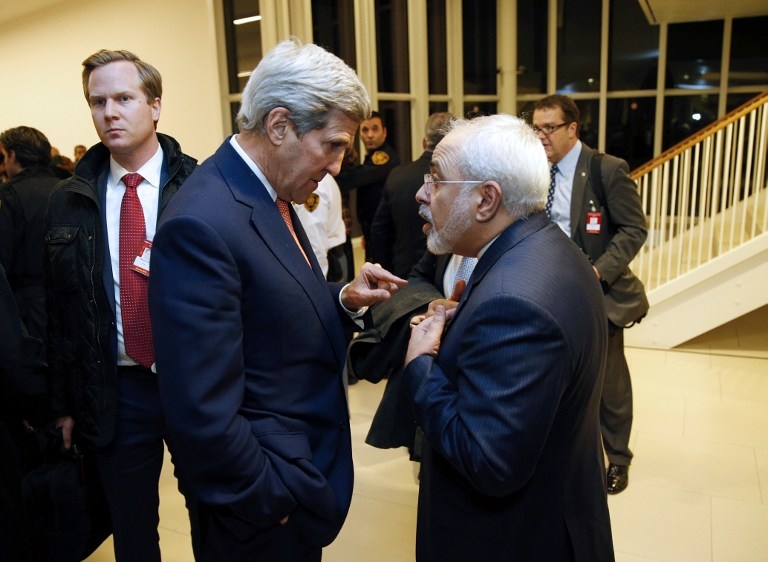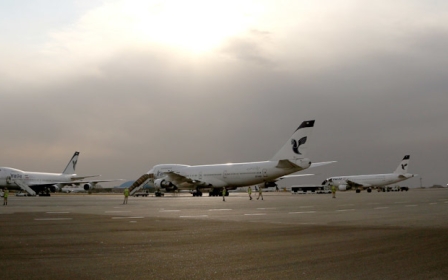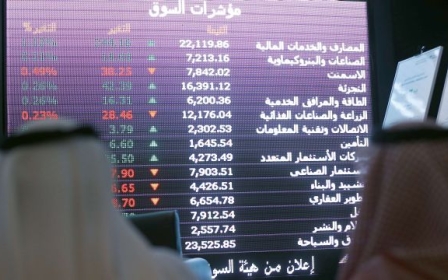Iran to accelerate missile programme as US presses new sanctions

Iran on Monday pledged to accelerate its ballistic missile programme in response to new sanctions imposed by the US on the same day that international sanctions over its nuclear activities were lifted.
The latest sanctions target five individuals and companies linked to Iran’s missile programme based in the United Arab Emirates and China, the US Treasury announced on Sunday, even as US President Barack Obama hailed the nuclear deal and the release of US hostages by Tehran.
Hossein Jaber Ansari, an Iranian foreign ministry spokesperson, said in response that Iran’s missile programme had never been designed to be capable of carrying nuclear weapons and was legal.
“The Islamic Republic of Iran responds with determination to such propaganda by accelerating its legal ballistic missile programme and boosting defence capabilities,” Ansari said, according to Iran's ISNA news agency
Defence Minister Hossein Dehghan said the new sanctions would have "no effect", telling the Fars news agency: "We will prove it in practice by unveiling new missile achievements."
Meanwhile, Yukiya Amano, the head of the International Atomic Energy Agency, arrived in Tehran on Monday for talks with President Hassan Rouhani as well as with Ali Akbar Salehi, Iran’s top nuclear official.
Under the terms of the nuclear deal agreed by Iran and world powers, the UN’s nuclear watchdog will monitor the country’s nuclear activities for eight years.
But if the IAEA certifies earlier that the programme is peaceful then Iran could accelerate development of its nuclear facilities.
In a weekend statement announcing Iran’s compliance with the nuclear deal, known as the Joint Comprehensive Plan of Action (JCPOA), Amano said relations between the IAEA and Tehran had entered a “new phase”.
“A lot of work has gone into getting us here, and implementation of this agreement will require a similar effort. For our part, we are ready to get on with the job.”
Behrouz Kamalvandi, a spokesperson for the Atomic Energy Organisation of Iran (AEOI), told ISNA that Amano had been invited to the country to discuss ways of speeding up implementation of the plan.
“In the JCPOA, the implementation process is estimated to be eight years but we want to accomplish this sooner and this is doable through cooperation between Iran and the IAEA,” he said.
Iranian President Rouhani celebrated the nuclear deal on Sunday by calling it a "golden chapter" in the country's history and a "turning point" for the Iranian economy.
“The nuclear deal is an opportunity that we should use to develop the country, improve the welfare of the nation, and create stability and security in the region,” Rouhani said.
But in a statement on Sunday, a US Treasury official said that Iran’s missile programme remained a “significant threat to regional and global security” and would continue to be subject to international sanctions, including restrictions on access to US bank accounts.
“We have consistently made clear that the United States will vigorously press sanctions against Iranian activities outside of the Joint Comprehensive Plan of Action – including those related to Iran’s support for terrorism, regional destabilisation, human rights abuses, and ballistic missile programme,” said Adam J. Szubin, acting Under Secretary for Terrorism and Financial Intelligence.
Oil production increase
Iran on Monday ordered as planned an increase in its oil production of 500,000 barrels per day following the lifting of sanctions under its nuclear deal with world powers.
"With the removal of sanctions, Iran is ready to increase production by 500,000 bpd and today this order was issued," Rokneddin Javadi, the head of the National Iranian Oil Company and the deputy oil minister, said in a statement.
Iran currently produces 2.8 million barrels per day and exports just over one million barrels.
Tehran had previously announced plans to increase production by half-a-million barrels after the lifting of international sanctions, and by another 500,000 bpd six months later.
The nuclear agreement came into force on Saturday, allowing the United States and the European Union to end sanctions against Iran, including against oil exports.
"The biggest problem on the oil market now is the 2 million bpd surplus that has driven down oil prices," Javadi said.
But he said Iran still needed to raise production.
"If Iran doesn't increase its oil production, neighbouring countries may in the next six to 12 months increase their production and take up Iran's share," he said.
Concerns that fresh Iranian exports will worsen a supply glut have helped push oil prices to 12-year lows, and they plunged below $28 a barrel early on Monday.
The fall in oil prices, though damaging for oil-dependent developing countries, could provide benefits to motorists in other countries.
According to some experts, fuel could end up being cheaper than bottle water in the UK if there is a continued fall in oil prices.
A spokesperson for the British RAC said that UK motorists could end up paying 86p per litre, presuming the pound maintains its current strength against the dollar
"Breaking through the pound a litre price point for both petrol and diesel was clearly a welcome landmark, but it looks as though there is more to come," said Simon Williams, RAC fuel spokesman, speaking to Sky News.
"In fact we may get to a bizarre time when a litre of fuel is cheaper than a litre of some bottled waters."
New MEE newsletter: Jerusalem Dispatch
Sign up to get the latest insights and analysis on Israel-Palestine, alongside Turkey Unpacked and other MEE newsletters
Middle East Eye delivers independent and unrivalled coverage and analysis of the Middle East, North Africa and beyond. To learn more about republishing this content and the associated fees, please fill out this form. More about MEE can be found here.




